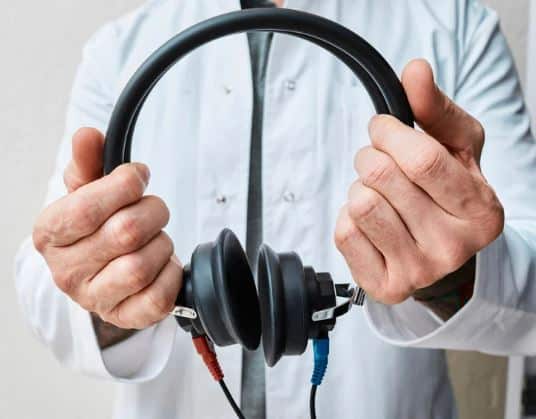MILAN, ITALY — The possibilities offered by cutting-edge scientific knowledge for assessing hearing loss, complementing traditional audiometric tests, and addressing the challenges of tinnitus were the central themes of the “What the Audiogram doesn’t tell us” Congress.
This two-day, in-depth scientific event concluded last Saturday in Lisbon, bringing together ENT-audiologists from Italy, France, Spain, and Portugal, with generous support from the Amplifon Centre for Research and Studies (CRS).
With a gathering of approximately 200 participants, including distinguished guests and speakers, the conference explored innovative approaches that expand our understanding of hearing health and its related disorders.
A Deeper Understanding of Hearing Health
 This year’s congress focused on three primary areas of discussion. Firstly, it delved into the clinical and non-clinical aspects that provide a comprehensive assessment of hearing functionality. Instead of relying solely on audiometric test results, participants explored various parameters, including patients’ phenotypes, potential traumas, genetic factors, and the connection between hearing loss and neurological conditions, such as cognitive decline.
This year’s congress focused on three primary areas of discussion. Firstly, it delved into the clinical and non-clinical aspects that provide a comprehensive assessment of hearing functionality. Instead of relying solely on audiometric test results, participants explored various parameters, including patients’ phenotypes, potential traumas, genetic factors, and the connection between hearing loss and neurological conditions, such as cognitive decline.
The event also covered the latest advancements in tinnitus research.
The scientific discussions featured presentations and roundtable sessions led by distinguished experts in the field. The faculty consisted of influential European opinion leaders, and the congress’s scientific coordination was supervised by an international panel of otolaryngologists. This panel included Professor Anna Rita Fetoni (Italy), Professor Bernard Fraysse (France), Professor Faustino Núñez Batalla (Spain), and Professor Ezequiel Barros (Portugal), guided by Mark Laureyns, Coordinator and Director of the Amplifon International CRS.
The faculty shared insights on the analysis of hidden hearing loss using innovative methodologies, such as speech audiometry in noisy environments while considering patients’ phenotypes. They also explored the connections with co-morbidities, such as central auditory processing disorders, and the broader relationship between cognitive decline and hearing loss. These discussions aimed to refine the assessment and rehabilitation of vulnerable patients.
The Congress “What the Audiogram doesn’t tell us” exemplified the ongoing efforts to advance the understanding and management of hearing loss and tinnitus, reflecting the latest scientific knowledge and practical applications in the field.
The Amplifon Centre for Research and Studies (CRS)
Since 1971, the Amplifon Centre for Research and Studies (CRS) has promoted congresses and training events for the medical profession, collaborating with universities and scientific societies to disseminate evidence-based information and, in addition, providing the scientific community with one of the richest private libraries in the fields of audiology and otolaryngology. Its prestige derives from the contribution of recognised national and international experts whose innovative contribution is fundamental for the continuous theoretical and practical updating of specialist physicians. For further information: www.crs.amplifon.com
Source: Amplifon






